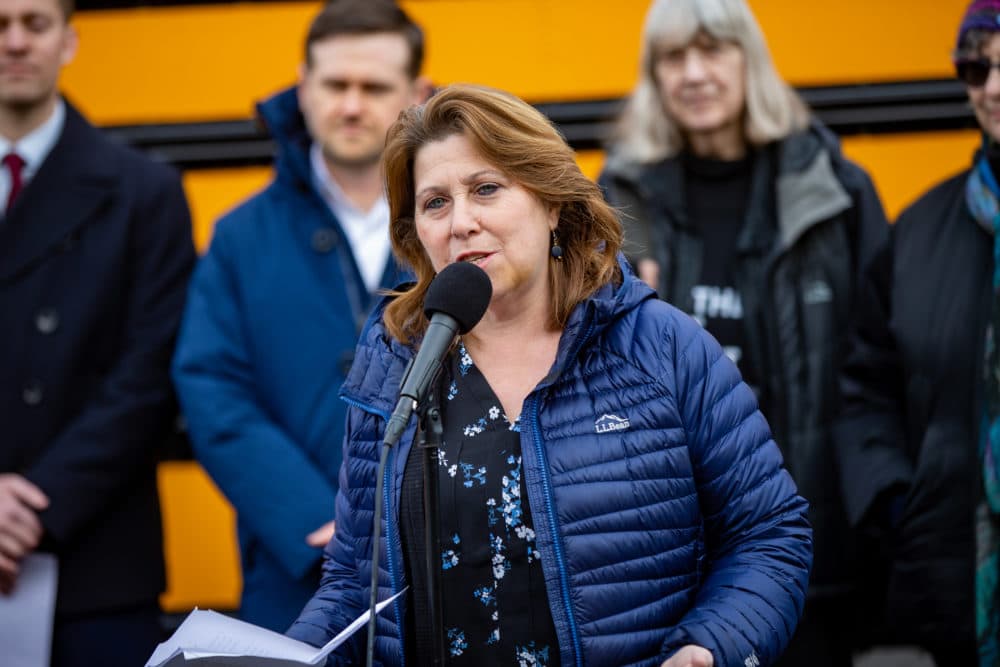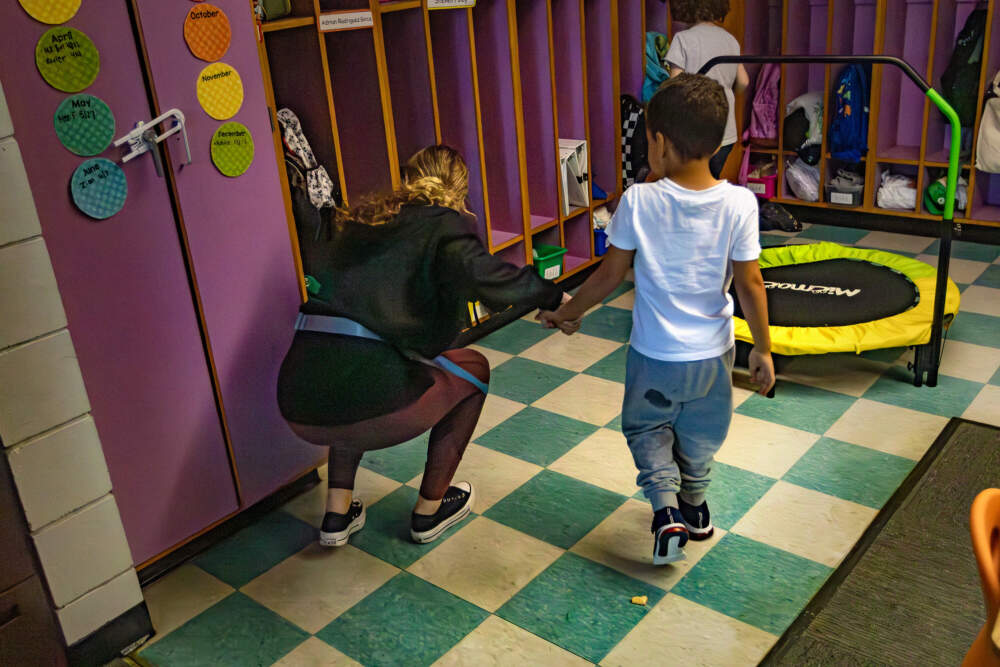Advertisement
With federal aid ending, Boston schools will see cuts — and changes — under latest budget
By a 5-2 vote, the Boston School Committee Wednesday signed off on a $1.52 billion operating budget for the city’s 119 public schools in the next fiscal year.
That large figure masks a rare decline in overall spending on the city’s schools, due in large part to the expiration of federal pandemic funds, known as ESSER, in September.
And Wednesday night’s discussion prior to the vote was marked by unusual reluctance from the city’s school committee, whose seven members are appointed by the mayor and who often vote unanimously in favor of district proposals.
Rafaela Polanco-Garcia and Quoc Tran raised serious reservations about the district’s plans for multilingual learners, while Michael O’Neill and Brandon Cardet-Hernandez both stressed that the district has to take urgent steps to “right-size” the district to fit its enrollment, which has declined by 14% in just seven years.
Cardet-Hernandez ultimately voted against approving the budget, along with Stephen Alkins.

In remarks before the vote, BPS Superintendent Mary Skipper argued that the district’s cuts to personnel could have been far worse if not for the city’s generosity. “This year, many other districts in our state and nation are facing much tougher budgets because they don’t have the same support we have here,” she said.
The city will commit an additional $81 million from its general fund to the district for the next fiscal year, which starts on July 1.
All told, Boston expects to spend 4% more on its schools than it did in the 2024 fiscal year. Its per-pupil spending is expected to top $30,000 next year, reflecting a 46% increase in the last five years, according to BPS’ budget proposal.
The FY25 budget does include some substantial new investments, including a near-doubling of municipal spending on universal pre-kindergarten — a top priority for Boston Mayor Michelle Wu — as well as hundreds of full-time staff dedicated to support the inclusion of students with disabilities in general-education classrooms.
Advertisement
As the district aims to welcome more students with disabilities and English learners into general education classrooms, it will make a $20 million investment in staffing to support that transition, mostly to support salaries for over 360 full-time staff.
But after factoring in ESSER losses, the district’s overall spending will still shrink by $114 million in the year ahead — including net staff reductions at two-thirds of the district’s 119 schools. That’s the first decline in overall spending in at least a decade.
Skipper noted that BPS is trying to address long-standing issues, spurred on by ongoing state oversight. District staff are pursuing large policy changes regarding facilities, financing and services for multilingual learners and students with disabilities. All that has led to real confusion about how this budget will play out over the next school year.
“Like with any experiment, when you have multiple variables, it’s really hard to fully unpack,” said Courtney Feeley Karp, a parent who serves on the governing board of the Henderson Inclusion School in Dorchester. “It’s resulting in a very cloudy lack of transparency in the numbers,” she added.
Positions lost after 'ESSER cliff'
The largest variable at play this year is the end of temporary federal COVID relief funds, which directed $159 million into the district in 2023-24.
“With ESSER, for the first time in many years, schools were able to offer services that they needed that were considered ‘extra’,” said Ruby Reyes, executive director of the Boston Education Justice Alliance, a citywide advocacy group.
Reyes cited one school that quadrupled its number of full-time social workers during the duration of ESSER funds. “The impact was huge,” she said of the extra services. “Now that’s being taken away.”

During ESSER’s last year in effect, BPS spent over $50 million, or 31% of the funds, on student and social support, with over 170 full-time staff serving students and their families as social workers, psychologists and food-service workers, among other positions.
District officials have said that many ESSER-funded positions will be transferred onto city rolls, but that the district’s median school can expect to lose 2.4 positions.
Some of those cuts will be painful.
At the Henderson K-12, music and arts are written into the school’s charter. But as far as Feeley Karp and other parent leaders could discern, the district’s plan is to cut those services fully next school year in the school’s elementary grades.
Meanwhile, the Edison K-8 School in Brighton will lose 15 full-time positions due to elimination of its seventh and eighth grades, while South Boston’s Condon School will lose 11 due to classroom consolidations.
District officials have said those cuts will particularly affect teachers, paraprofessional substitutes, lunch monitors and security and library paraprofessionals.
In 2021, BPS announced a commitment to establish a library in each of its 119 schools by 2026. But this budget marks a setback in that effort, with nearly 10 library positions cut districtwide.
During the public comment period Wednesday, several BPS library staff spoke out, including Emmanuel Oppong-Yeboah, formerly an English teacher. He said he became the school librarian at Joseph Lee School only after that 2021 commitment.
“That vision was drawn up through deliberate intention, to make our schools places where students felt represented,” Oppong-Yeboah said. “It’s so important that — as we’re making these decisions, considering cuts to be made — that we continue to show our students what we value.”
Skipper acknowledged the librarians and library paraprofessionals in her remarks, saying the district is “deeply committed to continuing our investment in the strategic library plan over the next several years, as we get beyond the ESSER cliff.”
As outlined in its December 2023 master facilities plan, BPS is still contemplating what could be dozens of school closures and mergers, along with classroom consolidations, as it adjusts to a smaller overall enrollment.
Meanwhile, the district is also transitioning away from “weighted student funding,” the complex formula it has used to target funds at students for more than a decade — with little clarity about the system that will replace it, Reyes, of Boston Education Justice Alliance, noted.
She added that inclusion will require more than a few additional staff to be done safely and effectively, and that many schools will not receive the additional staff they requested.
A process marked by 'inadequate information'
Other stakeholders have raised concerns about the transparency of the district’s budget process of late, given that school spending represents roughly 40% of the city of Boston’s overall yearly spending.
Since February, BPS officials have pursued a public process, holding nearly two dozen meetings with the public, school committee and city councilors. But many remain disappointed.
A March 13 report by the Boston Municipal Research Bureau concludes that the district has provided “inadequate information” to explain how its proposed budget specifically tackles the challenges the district is facing.
“As they try to understand the budget, the public and School Committee members are left to interpret row upon row of spreadsheet data with little narrative to guide them,” Bureau staff wrote.
Members of the school committee submitted questions to district officials from the start of the budget review process, but only recently received a document with responses, which offered some more details regarding school-level impacts.
Cheryl Buckman, a parent in South Boston, expressed her frustration with the process’s opacity. “[Administrators] are not up front. They always say, ‘it’s our goal to be transparent with the BPS community,’ and nine times out of ten, they’re not.”
Buckman’s son, she said, is “flourishing” in the inclusion program at the Dever Elementary School in Dorchester, with two teachers co-leading his fifth-grade classroom. But with the Dever set to lose 10 full-time staff positions next year, Buckman worries that “programs are going to disappear.”
“My son, hearing this, he goes to me, ‘Mama, where are my favorite teachers going to go when I start sixth grade?’, ” she said.
